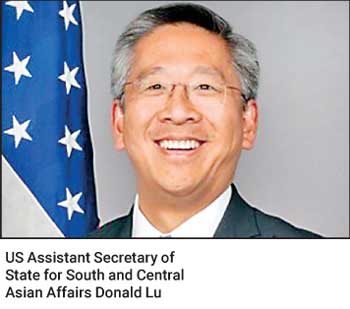Thursday Feb 19, 2026
Thursday Feb 19, 2026
Tuesday, 20 February 2024 01:57 - - {{hitsCtrl.values.hits}}
 United States Assis-tant Secretary of State for South and Central Asian Affairs Donald Lu has described Sri Lanka’s economic recovery as the greatest comeback story.
United States Assis-tant Secretary of State for South and Central Asian Affairs Donald Lu has described Sri Lanka’s economic recovery as the greatest comeback story.
“Americans love a comeback story. In the region I work on there is no greater comeback story than the story of Sri Lanka. If you were to go back with me in time, a year and a half you will remember a country in crisis, you will remember mass riots on the streets, you will remember lines for petrol and for food snaking around the corners.
You will remember protestors seizing the President’s home, protesters swimming in his swimming pool” he said. “If you have been to Sri Lanka lately, it is a very different place. Currency is stable. Goods and fuel prices are stable. They have gotten reassurances on their debt restructuring. And IMF money is flowing.” Lu added.
Lu made these comments while speaking at a high-powered panel along with other administration officials from the State Department, National Security Council and Pentagon to mark two years of the Joe Biden administration’s Indo-Pacific strategy at US Institute of Peace (USIP), a think tank in Washington DC, last week.
Lu went on to hail Sri Lanka as an example of the success of the administration’s Indo-Pacific strategy in collaboration with partners such as India. According to Lu, Sri Lanka’s comeback happened with the support of friends. Lu noted that the Indo-Pacific strategy is based on the premise that US and like-minded partners would try to offer a better proposition.
“What we saw was countries like India coming up with concessional loans that allowed Sri Lanka to bring in vital supplies during the most difficult time. USAID, during the same days, provided hundreds of millions of dollars in agricultural inputs, fertilisers and seeds, so farmers could grow their own crops.” he noted.
Lu also said the country’s creditors such as Japan, France and India, negotiated for months to find a formula to allow Sri Lanka to restructure its debt in a sustainable manner and it eventually put pressure on the Chinese to go along with those debt reassurances. “That opened up IMF funding and changes in the economy you witness today,” he said.
In a veiled reference to potential Chinese influence in the region, Lu suggested that a crucial aspect of Sri Lanka’s requirements now is support for its sovereignty from all stakeholders. “As part of our efforts from the US Government, we are contributing patrol boats to the Sri Lankan military,” Lu said.
Lu also highlighted the US Development Finance Corporation’s loans totalling $ 553 million for the development of a deep water shipping container terminal in the Port of Colombo. According to Lu this serves as an example of a loan that does not contribute to escalating debt but rather represents a private sector investment in a financially viable venture.